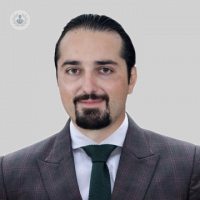Premium lenses and cataract surgery: Specialist insight from an expert
Written by:In this expert guide to premium lenses, revered consultant ophthalmologist Mr Nick Kopsachilis details why cataract surgery may be performed and the aims of the procedure. The leading specialist also sheds light on the advantages of premium lenses compared with standard lenses and the success rates of cataract surgery.

What is the aim of cataract surgery?
The main purpose of cataract surgery is to restore one’s vision. The surgery involves the removal of a cloudy lens, which we call cataract, from inside the eye.
Luckily, nowadays we have several options when it comes to replacing the natural lens. There are two types of artificial lens which we use as replacements; standard lenses and premium lenses. Premium lenses can offer distance, intermediate and near vision and can also correct some issues like astigmatism or irregularities in one’s vision, which differentiates them from standard lenses.
Who is the ideal candidate for this procedure?
The ideal candidate for cataract surgery with premium lenses is anyone over the age of around forty-five who wants to be spectacle free but is not eligible for laser refractive surgery. Cataract surgery can be performed, regardless of whether the patient is suffering from cataracts or not, for those who wish to no longer rely on spectacles. Although cataract surgery can be performed at the age of around forty-five, most of my patients tend to be of around fifty-five to sixty years of age.
When is cataract surgery necessary?
You may opt for cataract surgery with a premium lens simply because you want to be spectacle free. Additionally, patients who are suffering from early onset cataracts may require surgery. The development of a cloudy natural lens, or cataracts, can cause deterioration in your vision and affect the quality of your sight. It can also cause glare when driving or when the sun is very bright. Cataract surgery with a premium lens will restore good quality vision and correct issues such as glare.
How safe is cataract surgery? How long does it take to perform?
Cataract surgery is one of the safest operations and is performed worldwide. The risk of things going wrong is very low and less than one in ten thousand patients experience serious issues. Typically, the surgery itself lasts around ten minutes per eye. Nowadays, we can also perform the procedure bilaterally, meaning the surgery can be done on both eyes at the same time.
Are there any risks or side effects?
Cataract surgery like every surgery can have side effects. The main risks like losing sight or deteriorating vison are less than one out of ten thousand patients. There are minor risks which can be easily resolved with eye drops and these are again, less than one per cent of patients who undergo cataract surgery. The success rate of cataract surgery nowadays is over ninety-nine per cent.
If you think cataract surgery may be right for you and wish to discuss your options, you can schedule a consultation with Mr Kopsachilis by visiting his Top Doctors profile.


